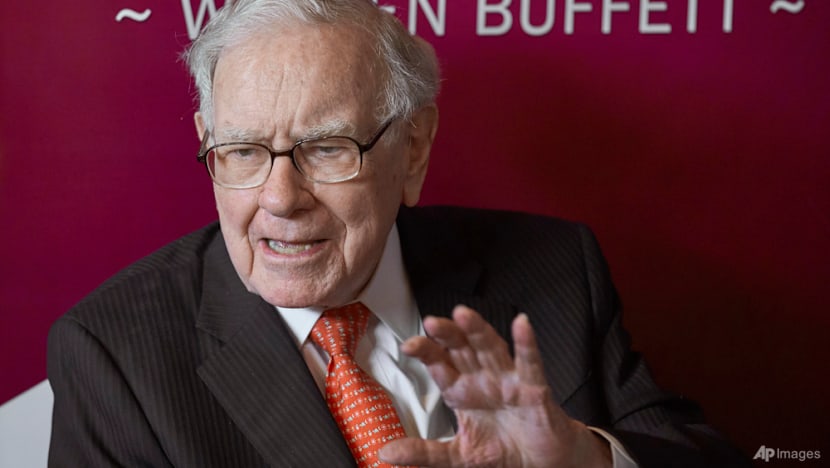Commentary: A wistful farewell to Warren Buffett’s annual letters
With the Berkshire Hathaway CEO passing authorship of the annual letter to his successor, it is the end of an era and a time to reflect on his accomplishments, says Jonathan Levin for Bloomberg Opinion.

Warren Buffett, Chairman and CEO of Berkshire Hathaway, speaks during a game of bridge following the annual Berkshire Hathaway shareholders meeting in Omaha, Nebraska, May 5, 2019. (AP Photo/Nati Harnik, File)
MIAMI: Innovation and influence are very distinct phenomena.
Bob Dylan, for instance, didn’t invent folk music: He borrowed extensively from Woody Guthrie, Pete Seeger and others in the folk revival movement of the fifties and sixties, yet he became far more influential than any of them. When he decided to go electric in the mid-1960s, rock n’ roll was already a dominant force in pop culture, yet Dylan became far more important for the genre than nearly all of the bands and solo acts that came before him.
Such is the relationship between Warren Buffett and earlier finance and investing writers, especially Benjamin Graham, author of The Intelligent Investor.
Buffett didn’t dream up most of the ideas that he espoused – many came straight out of Graham’s teachings – but he brought them to the masses through the Berkshire Hathaway annual letters and gave us all a proof of concept through the company’s extraordinary performance. In doing so, he earned his place as our greatest investor and our leading finance and investing writer. Without Buffett, we may not be talking about Graham at all today.
So, it was with a tinge of sadness that I learned last week that Buffett was poised to relinquish his most important annual writing exercise: the Berkshire letter. As part of his decision to step down as chief executive at the end of the year, the Wall Street Journal has reported that Buffett, 95, will pass the authorship of the Berkshire letter to his successor, Greg Abel. It is the end of an era, and a time to reflect on Buffett’s accomplishments.
THE FLIGHTINESS OF MR MARKET
Over the years, Buffett’s most memorable theme was the flightiness of “Mr Market” and the need to stay focused on intrinsic value. For Buffett, Mr Market – a character first conceived by Graham – was forever doomed to live with “incurable emotional problems”, as he wrote in Berkshire’s 1987 letter.
At times Mr Market was euphoric (prices were too high), and at others he was deeply depressed (prices were too low), but investors always had the discretion to ignore him or take him up on his occasionally bargain-bin prices.
The key, for Buffett, was to make sure you did your homework and had a firm grasp on the intrinsic value of your would-be investments. “Indeed, if you aren’t certain that you understand and can value your business far better than Mr Market, you don’t belong in the game,” Buffett wrote. “As they say in poker, ‘If you’ve been in the game 30 minutes and you don’t know who the patsy is, you’re the patsy.’”
And indeed, Buffett went on to prove that he belonged in the game, avoiding the dot-com bubble stocks in the late 1990s and building a very conservative portfolio ahead of the financial crisis, then subsequently pouncing when the crashes created opportunities.
Many of Buffett’s other recurring themes flowed naturally from that view of the market. If the market was manic and unpredictable, the key was to invest in a disciplined manner. Investors should only buy companies that they were capable of understanding and never be wooed by non-intuitive sales pitches and Wall Street esoterica.
As a manager, he always tried to explain Berkshire’s annual performance as if he were explaining it to his younger sister “Bertie”, AKA Roberta Buffett Elliott – someone with common sense and a keen interest in business news, but no particular expertise in economics or accounting. That readability is what made Buffett’s essays so great.
He claimed no particular gift for timing the market, but insisted on making investments with a “margin of safety”, another Grahamism that means buying at a price well cheaper than one’s estimate of intrinsic value.
And ultimately, Buffett has always insisted that investors maintain a long time horizon. At Berkshire, he was focused on attracting shareholders who shared that philosophy and was more than happy if that resulted in minimal trading in the company’s own stock.
“We don’t understand the CEO who wants lots of stock activity, for that can be achieved only if many of his owners are constantly exiting,” he wrote in the 1988 letter. “At what other organisation – school, club, church, etc – do leaders cheer when members leave?”
AN INTERESTING TIME TO STEP ASIDE
It’s turning into an interesting time for Buffett to step aside, both as an executive and a public intellectual. Much like the period before the financial crisis, Berkshire’s cash has been soaring, hitting a record US$381.7 billion in the third quarter.
That and Berkshire’s underweight orientation toward the hot tech and communications sectors have its stock portfolio returning just about 4.9 per cent this year, even as the S&P 500 advanced 17.7 per cent. If Buffett were interpreting his own results, he’d probably caution us against making too much about one year of underperformance.
And he’d focus on economic performance, rather than volatile market outcomes. “After all,” he wrote in the 1983 letter, “why should the time required for a planet to circle the sun synchronise precisely with the time required for business actions to pay off? Instead, we recommend not less than a five-year test as a rough yardstick of economic performance.”
Come 2030, we’ll have to turn to Greg Abel to help us make sense of the results and decide if Berkshire is still living up to Buffett’s expectations. Perhaps his missives will prove must-reads too, but he’ll never be Warren Buffett.















